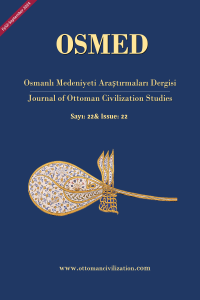Benedek Péri, [Ḥaydar Ḫˇārizmī, “Maḫzan-al-asrār”- The Treasury of Secrets], Library and Information Centre of the Hungarian Academy of Sciences, Budapest 2020
Abstract
Poets have shown their admiration for the distinguished poets that they have influenced by using the attitude, tone, meter, and rhyme of their poems. Writing a poem by another poet with the same subject, meter, rhyme, or redif is called "nazire” or “tanzir”. Nazire, which has been seen in Turkish and Persian literature since the 12th century, pioneered the development of poets and led to the formation of nazire magazines. From the 16th century onwards, it is seen that these magazines have become widespread. Many poets made naziras to the Maḫzenu’l-esrār of Nizāmī-i Gencevī’s (582/1186-602/1209). One of these naziras was Maḫzenu’l-esrār by the 14th-15th century poet Ḥaydar Ḫˇārizmī, (d.?/? - ö. ?/?) also known as Mīr Ḥaydar/Haydar Tilbe. A study was also made by Benedek Péri about Maḫzenu’l-esrār, which has become a tradition among Turkish poets and is one of the naziras made especially to the Maḫzenu’l-esrār masnavi of Gencevī. Péri, who wrote the work named Maḫzenu’l-esrār with the same name, introduced the life and work of Ḫˇārizmī, then transcribed the text based on the Budapest copy of the work and translated it into English. In this study, the work named “Benedek Péri, [Ḥaydar Ḫˇārizmī, “Maḫzan-al-asrār”- The Treasury of Secrets], Library and Information Centre of the Hungarian Academy of Sciences, Budapest 2020” will be introduced.
Keywords
References
- Péri, Benedek. Ḥaydar Ḫˇārizmī “Maḫzan-al-asrār”, The Treasury of Secrets. Budapest: Library and Information Centre of the Hungarian Academy of Sciences, 2020.
- Péri, Benedek. Az indiai timuridák és a török nyelv. A török írás- és szóbeliség a Mogul-kori Indiában (Indian Timurids and Turkic language. Turkic Language and Literature in Mughal India). Piliscsaba: Avicenna Közel-Kelet Kutatások Intézete, 2005.
- Péri, Benedek. “Turki Language and Literature in Late Mughal India as Reflected in a Unique Collection of Texts,” A.C.S Peacock ve Richard Piran McClary (ed.), Turkish History and Culture in India. Leiden: Brill, 2020, 367-387.
- Péri, Benedek. “Ḥaydar Ḫˇārizmī’s “Maḫzan-al-asrār” and a Peculiarity of the “Maḫzan-al-asrār” Manuscript Tradition”, István Zimonyi (ed.), Altaic and Chagatay Lectures, Studies in Honour of Éva Kincses-Nagy. Szeged: University of Szeged, 2021, 317-327.
Benedek Péri, [Ḥaydar Ḫˇārizmī, “Maḫzan-al-asrār”- The Treasury of Secrets], Library and Information Centre of the Hungarian Academy of Sciences, Budapest 2020
Abstract
Şairler, etkisinde kaldıkları mümtaz şairlere olan hayranlıklarını, onların şiirlerinin tavrını, edasını, veznini ve kafiyesini kullanarak göstermişlerdir. Bir şairin şiirini başka bir şairin aynı konu, vezin, kafiye veya redifle yazması işine “nazire” veya “tanzîr” adı verilir. Türk ve Fars edebiyatında 12. yüzyıldan itibaren görülen nazire, şairlerin yetişmesine öncülük ederken nazire mecmualarının oluşmasını da sağlamıştır. 16. yüzyıldan itibaren bu mecmuaların yaygınlaştığı görülmektedir. Pek çok şair Nizāmī-i Gencevī’nin (582/1186-602/1209) Maḫzenu’l-esrār isimli eserine nazire yazmıştır. Bu nazirelerden biri de Mīr Ḥaydar/Haydar Tilbe olarak da bilinen 14-15. asır şairi Ḥaydar Ḫˇārizmī’nin (d.?/? - ö. ?/?) Maḫzenu’l-esrār’ıdır. Türk şairleri arasında gelenek hâline gelmiş ve özellikle Gencevī’nin Maḫzenu’l-esrār mesnevisine yapılan nazirelerden biri olan Maḫzenu’l-esrār üzerine de Benedek Péri tarafından bir çalışma yapılmıştır. Mahzenu’l-esrār’ı aynı adla yazan Péri, Ḫˇārizmī’nin hayatını ve eserini tanıttıktan sonra eserin Budapeşte nüshasını esas alarak metni transkribe etmiş ve İngilizce çevirisini yapmıştır. Bu çalışmada, “Benedek Péri, [Ḥaydar Ḫˇārizmī, “Maḫzan-al-asrār”- The Treasury of Secrets], Library and Information Centre of the Hungarian Academy of Sciences, Budapest 2020” adlı eserin tanıtımı yapılacaktır.
Keywords
References
- Péri, Benedek. Ḥaydar Ḫˇārizmī “Maḫzan-al-asrār”, The Treasury of Secrets. Budapest: Library and Information Centre of the Hungarian Academy of Sciences, 2020.
- Péri, Benedek. Az indiai timuridák és a török nyelv. A török írás- és szóbeliség a Mogul-kori Indiában (Indian Timurids and Turkic language. Turkic Language and Literature in Mughal India). Piliscsaba: Avicenna Közel-Kelet Kutatások Intézete, 2005.
- Péri, Benedek. “Turki Language and Literature in Late Mughal India as Reflected in a Unique Collection of Texts,” A.C.S Peacock ve Richard Piran McClary (ed.), Turkish History and Culture in India. Leiden: Brill, 2020, 367-387.
- Péri, Benedek. “Ḥaydar Ḫˇārizmī’s “Maḫzan-al-asrār” and a Peculiarity of the “Maḫzan-al-asrār” Manuscript Tradition”, István Zimonyi (ed.), Altaic and Chagatay Lectures, Studies in Honour of Éva Kincses-Nagy. Szeged: University of Szeged, 2021, 317-327.
Details
| Primary Language | Turkish |
|---|---|
| Subjects | Ottoman Society |
| Journal Section | Book Review |
| Authors | |
| Publication Date | September 15, 2024 |
| Submission Date | June 11, 2024 |
| Acceptance Date | July 6, 2024 |
| Published in Issue | Year 2024 Issue: 22 |
Cite
Indexes
SCOPUS, TÜBİTAK/ULAKBİM TR DİZİN [SBVT]
INDEX COPERNİCUS [ICI], ISAM, SOBIAD and Scilit.

Unless otherwise stated, the articles published in our magazine are licensed under the Creative Commons Attribution 4.0 International (CC BY 4.0) license. All authors and translators who submit texts for publication in the journal are expected to be the sole copyright holders of the submitted text or to have obtained the necessary permissions. By submitting texts to the journal, authors and translators implicitly accept that these texts will be licensed under CC BY 4.0 unless explicitly stated otherwise to the editors at the outset.

